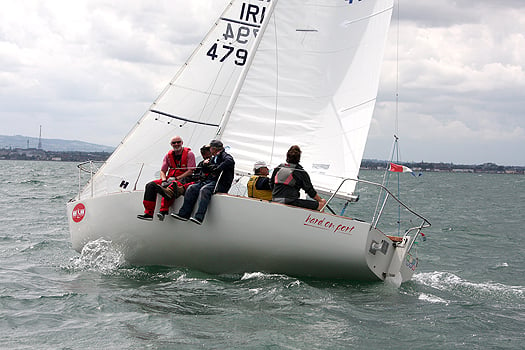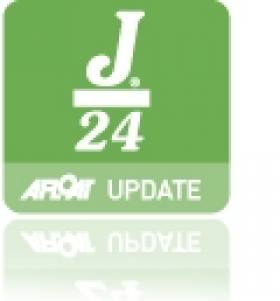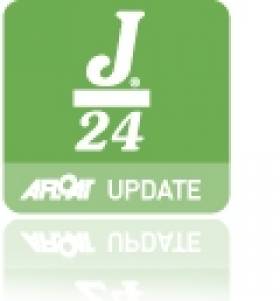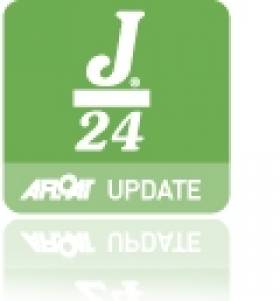Displaying items by tag: J24 National Championships
#J24 – Britain's Ian Southworth totally dominated the J24 National Championships at Howth over the weekend, with five race wins in the 8-race series, while the Howth U-25 Keelboat team, as the highest placed Irish boat in the event in 6th place, were crowned National Champions.
In what was a useful practice before the BMW J24 World Championship in a week's time, Southworth and his crew on 'Il Riccio' from the Royal Corinthian YC demonstrated remarkable boat speed in the strong and gusty westerly and south-westerly winds. Three bullets and a second place meant they topped the leaderboard after the first day's racing ahead of compatriot Bob Turner ('Serco') from Castle Cove SC.
The Howth U25 crew sailing 'Euro Car Parks Killcullen' had a consistent first day, although defending Irish champion J-P McCaldin was narrowly the best of the local boats after day 1. The young HYC team moved up a gear on the second day to record 4, 5, 7 and 9 to finish five points clear of nearest Irish rival Flor O'Driscoll ('Hard on Port') while another Howth boat, 'Stouche' (Darrer/Murphy) took 8th overall and 3rd of the Irish entries.
The statistics show that Southworth only beat American Keith Whittemore from Seattle by 0.5 points overall but they didn't compete in the last two races (they had to catch a plane home!) giving an artificially narrow margin that didn't do justice to their dominance over the two days.
Another American, Tony Parker, finished behind third-placed Bob Turner and a single point ahead fifth placed Paul Williams from Britain.
Southworth is familiar with the Howth waters, having won the BMW J24 Europeans there two years ago and his crew's performance at the Nationals underlines what a threat they will be at the forthcoming Worlds.
Howth J24 Nationals Attracts Top Overseas Entries
#J24 – Four top crews from the USA and Britain will be in action at the J24 National Championship at Howth this weekend as they use the event as an ideal warm-up and familiarisation session before the BMW J24 World Championship takes place on the same waters a week later.
Ian Southworth, from Royal Corinthian YC, who won the Europeans in Howth two years ago, and Bob Turner from Castle Cove SC, head the British challenge while Tony Parker from Annapolis and Keith Whittemore from Seattle are the two American skippers taking the event seriously.
Lough Erne's J-P McCaldin is the defending Irish Champion and he can expect stiff competition from multiple champion Flor O'Driscoll of the host club. Many eyes, however, will be on the performance of the Howth Under-25 Keelboat Team that has been making steady progress in the build-up to the Worlds.
A baptism of fire in the Europeans in 2011 has been followed by ongoing development and improvement, culminating in success recently in winning the J24 Eastern Championship. The team comprises Cillian Dickson, Joseph Murphy, Harry O'Reilly, Ross Darmody and Gordon Stirling.
The Irish Nationals has eight races scheduled and has attracted 20 entries from 10 different clubs.
O'Driscoll retains J24 title at Lough Erne
Flor O’Driscoll and his crew on ‘Hard on Port’ successfully defended their Irish J24 Championship title at Lough Erne last weekend but they were pushed hard all the way by the two McCaldins, Mickey and son JP, from the host club.
The eight-race championship, sponsored by Waterways Ireland, was sailed in a wide variety of wind strengths, with rain showers a feature on both days and particularly heavy conditions for the final race.
O’Driscoll, from the Royal St.George YC but sailing out of Howth this year in readiness for the forthcoming Europeans there, started slowly by his standards with a 3rd and 4th while the McCaldins took it in turns to cross the line first. He got more into his stride in race three and five with bullets but had an OCS in race 4, ultimately his discard.

Flor O'Driscoll's Hard on Port was the winner of the weekend J24 Nationals
Andrew Mannion of Lough Ree YC sailing ‘Jeb Stuart’ won the fourth race comfortably while a former champion Stefan Hyde on ‘Kilcullen’ took the last race of the day.
With the McCaldins the only major threat, O’Driscoll sailed two tactically clever races to ensure that neither could overtake his lead, finishing second to Mickey in race 7 and one place (4th) ahead of JP in the final race (won by Stefan Hyde again). After discards, he had a 7-point margin of victory, a reward for consistently finishing in the top three in six of eight races.
The 16-boat event also included a separate trophy for the ‘silver fleet’ which was won by Javelin (Stan Bradbury) from Lough Ree YC.
Waterways Ireland Irish J24 National Championships – Lough Erne YC
- Hard on Port Flor O’Driscoll RSt.GYC 17 points
- Murder Picture Mickey McCaldin LEYC 24 points
- Jamais Encore JP McCaldin LEYC 25 points
- Kilcullen Stefan Hyde RCYC 26 points
- Sayanara Martin Darrer RCYC 26 points
- Jeb Stuart Andrew Mannion LRYC 34 points































































